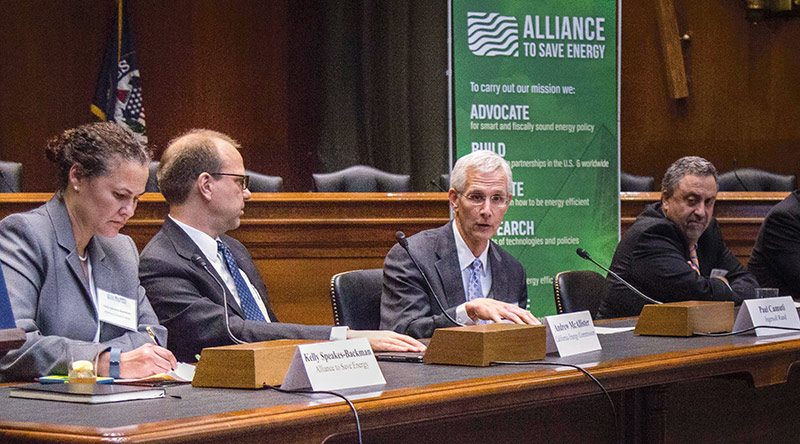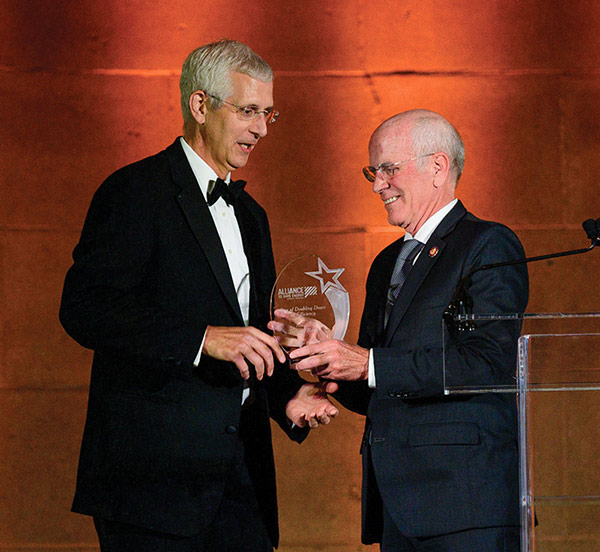
Over more than three decades, industrial and systems engineering alum Paul Camuti ’83 has steered large-scale enterprises toward enhanced energy efficiency and sustainable business practices. Camuti served in senior leadership roles at Siemens Corporation, including as president of smart grid applications for Siemens Energy Inc. He is currently executive vice president and chief technology and strategy officer for Trane Technologies (formerly Ingersoll Rand)—a newly launched “pure play climate company”—where he continues to push for aggressive corporate sustainability goals while driving climate-focused innovations for commercial buildings, homes, and transportation.
Q: What do you see as the responsibility of companies when it comes to confronting issues of sustainability and climate change?
A: Large, global challenges—like resource constraints, growing urbanization, and a demographic shift—are all putting stress on the planet. The built environment is responsible for about 15 percent of the world’s carbon emissions today—and with current heating and cooling trends, it could go to as high as 25 percent by 2030. Transport refrigeration for food, pharmaceuticals, and other perishables accounts for another 8 percent of all the world’s emissions.
At the same time, there is a whole new set of energy efficient technologies that are advancing at an ever-increasing rate. For example, we’re putting sustainability at the core of everything we do while implementing new thinking and devising new solutions at the convergence of these technologies and challenges.
For years, there has been a lot of focus on the regulatory environment and the role that governments and individuals play. But collectively, companies have the largest and probably the most immediate impact in solving global challenges.
At Trane Technologies, we think it’s our responsibility to take bold action around climate change. But we also don’t see this as incongruent with creating a high-performing company that investors want to invest in and, more importantly, the type of organization that people want to work for. The idea that you have to choose between premier performance or bold sustainability action is a false choice: We see them as different sides of the same coin.
|
Paul Camuti ’83 speaks at an Alliance to Save Energy forum on energy efficiency policy in Washington, D.C. (Photo credit: Alliance to Save Energy) |
Q: Has something changed in the marketplace to make that so?
A: People are bringing a social conscience to the evaluation of heating and cooling equipment, and we’re seeing demand for these solutions go up. Investors are in the same boat. Investors generally, and I think rightfully, are focused on returns. But all over the world right now, people know that the long-term stability of an investment is directly related to environ-mental, social, and governance topics. And our focus has put us at the lead of a set of people who look for sustainable investments. There isn’t a trade-off between doing the right thing and making money. We are very focused on delivering good economics because we’re focused on doing the right thing, not in spite of it.
Q: What innovations do you find most exciting in terms of their potential effects on sustainability goals?
A: Trane Technologies is in a unique position to address major sustainability issues and reduce our customers’ carbon emissions. We’re pioneering next-generation refrigerants and technologies to improve the efficiency and dramatically change the life-cycle impact of heating and cooling equipment. At the same time, we’re also developing and applying new digital technologies—around information and communication, Internet of Things, artificial intelligence, and AI-enabled optimization of these systems—that will create significant system-level efficiencies. Finally, we’re working on business model innovation, thinking about the shared economy and making sure that we’re not dramatically overdeploying these technologies.
Q: What inspires you about the newest generation of engineers?
A: Our recruiting today on college campuses, particularly with engineers but also with finance people, marketing people, HR people, is that graduates are looking for more than just a job. They’re looking for a job with a purpose and a place to pursue their passion, whether that’s helping people through health care, or in our particular case, by lowering the energy intensity of the world. Our purpose is “to boldly challenge what’s possible for a sustainable future,” and it really resonates with people. I think for companies that don’t have a clear and articulated purpose, it’s increasingly difficult to recruit the best, the brightest, and the most motivated students. And, clearly for the work that we do—applying technology to these large challenges—engineers are critical.
|
Camuti, who serves on the Alliance’s board of directors, accepts the coalition’s 2019 Star of Doubling Down on Efficiency award on behalf of Ingersoll Rand. (Photo credit: Erin Scott) |
Q: How does an engineering education—and in your experience, industrial engineering—serve as preparation for a career in corporate leadership?
A: Engineers are problem solvers. The method and structure and analytics that come from the engineering discipline, and the passion for solving problems, have been really helpful in every role that I’ve had, including those in corporate leadership. I think Lehigh does a better job than most engineering schools in instilling practical and useful problem-solving skills in our undergraduate engineers. I also see the convergence of technology in all disciplines and aspects of a business. My industrial and systems engineering background was really focused on the application of computer technology. And being really fluent and not afraid of information and communication technology has paid off for me personally. I think that’s true now of everyone, right? I can’t imagine people working in marketing or workforce planning or finance or legal departments that are not technology enabled.
Q: When you think about climate change, do you ever experience a sense of optimism or hope?
A: If you watch the news, you’ll see things like the wildfires in Australia, and say, “My gosh, we have to get after it and do something.” These are large-scale problems, and it’s easy to get discouraged. We’re not acting fast enough. Yet, what keeps me totally optimistic comes down to this: The majority of people who want to work for us today are searching for this sense of purpose and want to make a difference. If we can harness the creativity, ingenuity, and commitment of large groups of people, we can move faster than what anybody would predict. Reinforcing that is the pace at which we’re seeing our customers, investors, and employees embrace sustainability. I’m optimistic that engaged people are going to put their energy and effort into finding solutions. And there’s certainly enough technology around that we can harness to bend the curve faster than we might expect. That’s why companies must set bold commitments—and that’s what keeps me optimistic in the face of these challenges.
Interview by Katie Kackenmeister


